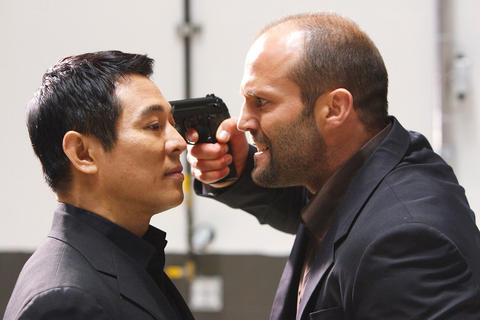You could fill a small junkyard with the films Jet Li (李連杰) and Jason Statham have made separately. Perhaps to cut down on waste, they've teamed up for a single trip to the dumpster. The occasion is War, a title the movie never quite lives up to. Spat or Tiff might be more accurate.
Directed by Philip Atwell, the movie barely utilizes either man's strengths. Statham gets one or two fight sequences (he remains clothed for both) and has dialogue so terrible not even he can trick you into laughing at it. Li, meanwhile, seems to be playing a robot of himself. He barrels dutifully from scene to scene, speaking his halting English with a dispiriting lack of joy. Even his kicks have no crackle. He gives us business when we've come for pleasure.
The screenplay contains a lot of exposition but no explanation. We know this much: the Yakuza and Chinese Triads are at each other's throats over ancient treasures. Li plays a character named Rogue, a psychopath whose pulse never rises. Rogue is also a whore of a hit man – he'll kill anybody on either side of this skirmish if asked. He spends a lot of time with a prissy Triad boss, played by John Lone, who does all he can to take the part seriously ("Revenge is a must!" he snarls).

PHOTO: COURTESY OF WARNER BROTHERS
But Rogue has no problem causing trouble for the boss. He furtively foments conflict between the Triad and the Yakuza, who keep him on their payroll. Conflict even takes the form of a deadly motorbike chase.
It turns out that Rogue has killed the partner of FBI agent, John Crawford, and the partner's family. Crawford has spent years trying to catch the killer. His ex-wife is still annoyed, and her lines could be from Brokeback Mountain Two: "Look, your obsession with this man has cost you your marriage!" (For what it's worth, the movie is set in San Francisco.)
His marriage over, Crawford chases Rogue from one terribly assembled shootout and swordfight to the next. These scenes are so ugly and rushed that we can't figure out what's going on.

PHOTO: COURTESY OF WARNER BROTHERS
No one who's witnessed any of the graceful yet blistering combat in the Bourne movies should stand for action sequences that look like they've been edited with an Uzi.
Fun here is fleeting. Mathew St Patrick, as Crawford's new partner, shows some teasing spontaneity. And Devon Aoki, as the Yakuza head's daughter, has a good scene, holding a knife to one underling and a gun to another, obviously stressed out.
"I just got off a 14-hour flight. I want a salad," she says. "Dressing on the side." The best acting in the whole picture is the confused looks those two dudes give her.

June 9 to June 15 A photo of two men riding trendy high-wheel Penny-Farthing bicycles past a Qing Dynasty gate aptly captures the essence of Taipei in 1897 — a newly colonized city on the cusp of great change. The Japanese began making significant modifications to the cityscape in 1899, tearing down Qing-era structures, widening boulevards and installing Western-style infrastructure and buildings. The photographer, Minosuke Imamura, only spent a year in Taiwan as a cartographer for the governor-general’s office, but he left behind a treasure trove of 130 images showing life at the onset of Japanese rule, spanning July 1897 to

In an interview posted online by United Daily News (UDN) on May 26, current Chinese Nationalist Party (KMT) Chairman Eric Chu (朱立倫) was asked about Taichung Mayor Lu Shiow-yen (盧秀燕) replacing him as party chair. Though not yet officially running, by the customs of Taiwan politics, Lu has been signalling she is both running for party chair and to be the party’s 2028 presidential candidate. She told an international media outlet that she was considering a run. She also gave a speech in Keelung on national priorities and foreign affairs. For details, see the May 23 edition of this column,

The Taiwan People’s Party (TPP) on May 18 held a rally in Taichung to mark the anniversary of President William Lai’s (賴清德) inauguration on May 20. The title of the rally could be loosely translated to “May 18 recall fraudulent goods” (518退貨ㄌㄨㄚˋ!). Unlike in English, where the terms are the same, “recall” (退貨) in this context refers to product recalls due to damaged, defective or fraudulent merchandise, not the political recalls (罷免) currently dominating the headlines. I attended the rally to determine if the impression was correct that the TPP under party Chairman Huang Kuo-Chang (黃國昌) had little of a

At Computex 2025, Nvidia CEO Jensen Huang (黃仁勳) urged the government to subsidize AI. “All schools in Taiwan must integrate AI into their curricula,” he declared. A few months earlier, he said, “If I were a student today, I’d immediately start using tools like ChatGPT, Gemini Pro and Grok to learn, write and accelerate my thinking.” Huang sees the AI-bullet train leaving the station. And as one of its drivers, he’s worried about youth not getting on board — bad for their careers, and bad for his workforce. As a semiconductor supply-chain powerhouse and AI hub wannabe, Taiwan is seeing